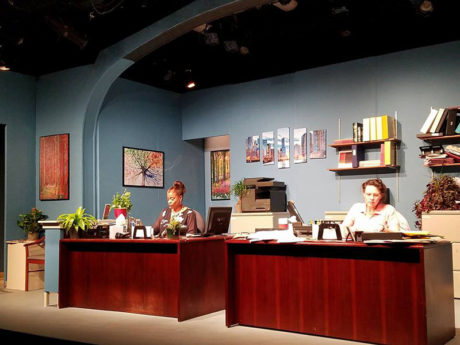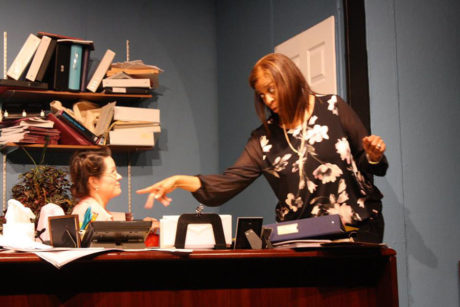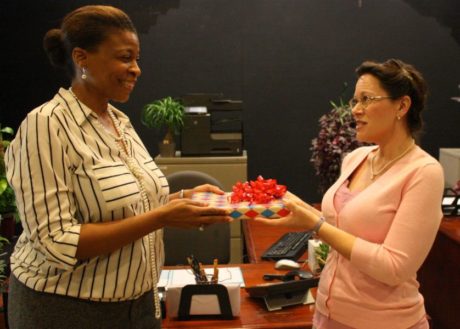The setting is ordinary – an office with two desks side by side. The desks are covered with plants, knickknacks, and piles of paperwork. The sort of thing we see every day in corporate America. But this ordinary office is also a battleground in a struggle over office politics and racial politics. And that’s ordinary too, even if we don’t always want to acknowledge it.
Rasheeda Speaking, Joel Drake Johnson’s play now receiving a stimulating production at Allens Lane Theater, exposes the tensions bubbling beneath the surface in American society. As Johnson demonstrates, what’s said, and what isn’t said, isn’t always polite.

Johnson sets his play in the reception area of a Chicago doctor’s office. The doctor is confiding in Ileen, his (white) assistant of eight years, about his displeasure in Jaclyn, her (black) co-worker of six months. It’s not Jaclyn’s work output he’s dissatisfied with, but her attitude. “She hates me,” he complains. “She never looks me in the eye.” But the doctor goes further, couching his racism in tactful code words: Jaclyn is “too angry,” he says, too “mad at the world.” It’s “their” way of looking at the world, he says, a method of “protecting themselves from their own lack of self-esteem and power, a power they will probably never, never have.” He instructs Ileen to secretly compile a list of Jaclyn’s failings so that he can justify firing her.
When Jaclyn arrives, it’s clear that some of the doctor’s complaints are valid. She’s cheery one moment, angry the next. She’s openly contemptuous of the doctor – she really won’t look him in the eye – and she’s downright rude to an elderly patient. When Ileen urges her to be more courteous, she resists.
But Jaclyn is shrewd, too – she sees right through the plot to oust her, and she knows what it’s really about. She soon begins playing discreet mind games to unnerve the weak-willed Ileen, playing to her prejudices. In the play’s most powerful moment, Jaclyn tells Ileen a story about her bus trip to work, where she overhears young white men jokingly calling all the middle-aged black women they see “Rasheeda.” And to Jaclyn, dismissive treatment like that – and the many other slights she has to face every day – is justification enough for her behavior.
“Not everyone is racist,” Ileen responds through her tears.
“Really?” says Jaclyn sarcastically. “I’ll have to think about that one.”

Rasheeda Speaking isn’t perfect, and it isn’t subtle – at times it slips into broad caricature to make its points. The characters, aside from Jaclyn, lack depth. The structure could use some work: the audience burst into applause at the blackout that ends scene three, clearly thinking the play had come to an end, even though there was one more scene to go. And Jaclyn’s behavior, as it skids from rudeness to outright sadism, becomes more and more inconsistent, more and more uncomfortable to watch, and less and less likable.
But then again, none of the other characters are likable either. And while the white characters are never asked to justify their own anger – such as the patient, who makes the most openly bigoted remark of the entire play – Jaclyn constantly, and needlessly, has to justify hers. That, Johnson reminds us, is a huge part of being a minority in America today. And that’s what makes Rasheeda Speaking so compelling.
Scott R. Grumling’s direction moves quickly, allowing the snappy lines to land with just the right amount of sting. Angie Henderson-Goode has a field day as Jaclyn, mastering all the emotional intricacies of a complex character. Leah O’Hara, as the spineless Ileen, gets more and more despondent and glassy-eyed as the play goes along, virtually shrinking before our eyes. Linda Palmarozza provides solid support as the patient. But Tom Boland, as the snooty doctor, takes too many pauses that break up the play’s rhythm.
Director Grumling provided the set design, which ably defines the routine setting for this anything-but-routine struggle. Grumling also did the sound design, and Kim Pelle does the lighting.
Running Time: One hour and 50 minutes, with no intermission.

Rasheeda Speaking plays through December 3, 2017 at Allens Lane Theater at the Allens Lane Art Center – 601 West Allens Lane, in Philadelphia, PA. For tickets, call the box office at (215) 248-0546, or purchase them online.




